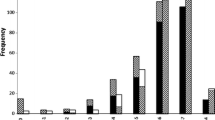Abstract
We consider a demand bargaining model where the formateur (proposal maker) is appointed before the players state their demands. In a general continuous framework, we show that if the decision has a distributive dimension, then the formateur gets his way.
Similar content being viewed by others
References
Austen-Smith D, Banks J (1990) Stable governments and the allocation of policy portfolios. Am Polit Sci Rev 84(3)
Banks J, Duggan J (2006) A general bargaining model of legislative policy-making. Q J Polit Sci 1: 49–85
Baron D, Diermeier D (2001) Elections, governments and parliaments under proportional representation. Q J Econ 116: 933–67
Baron D, Ferejohn J (1989) Bargaining in legislatures. Am Polit Sci Rev 83: 1181–1206
Cardona-Coll D (2003) Bargaining and strategic demand commitment. Theory Decis 54: 357–74
Cheibub JA, Przeworski A, Saiegh SM (2004) Government coalitions and legislative success under presidentialism and parliamentarism. Br J Polit Sci 34: 565–87
Dasgupta A, Chiu YS (1998) On implementation via demand commitment games. Int J Game Theory 27: 161–89
Diermeier D (2006) Coalition government. In: Weingast BR, Wittman D (eds) The Oxford handbook of political economy. Oxford University Press, Oxford, pp 162–179
Diermeier D, Merlo A (2000) Government turnover in parliamentary democracies. J Econ Theory 94: 46–79
Eraslan H (2002) Uniqueness of stationary equilibrium payoffs in the Baron–Ferejohn model. J Econ Theory 103: 11–30
Fréchette G, Kagel JH, Morelli M (2005) Behavioral identification in coalitional bargaining: an experimental analysis of demand bargaining and alternating offers. Econometrica 73(6): 1893–937
Harrington JE (1990) The power of the proposal maker in a model of endogenous agenda formation. Public Choice 64(1): 1–20
Jackson MO, Moselle B (2002) Coalition and party formation in a legislative voting game. J Econ Theory 103: 49–87
Laver M, Shepsle KA (1990) Coalitions and cabinet government. Am Polit Sci Rev 84: 873–890
Montero M, Vidal-Puga JJ (2007) Demand commitment in legislative bargaining. Am Polit Sci Rev 101(4): 847–50
Morelli M (1999) Demand competition and policy compromise in legislative bargaining. Am Polit Sci Rev 93(4): 809–820
Morelli M (2007) Demand commitment and legislative bargaining: a response. Am Polit Sci Rev 101(4): 851
Snyder JM, Ting MM, Ansolabehere S (2005) Legislative bargaining under weighted voting. Am Econ Rev 95(4): 981–1004
Vidal-Puga JJ (2004) Bargaining with commitments. Int J Game Theory 33(1): 129–44
Winter E (1994) The demand commitment bargaining and snowballing cooperation. Econ Theory 4: 255–73
Author information
Authors and Affiliations
Corresponding author
Additional information
I thank Friedel Bolle, Jonathan Tan, the editor, and an anonymous referee for very helpful comments. In addition, I gratefully acknowledge the support of the DFG (project no. BO 747/10-1).
Rights and permissions
About this article
Cite this article
Breitmoser, Y. Demand commitments in majority bargaining or how formateurs get their way. Int J Game Theory 38, 183–191 (2009). https://doi.org/10.1007/s00182-008-0144-3
Accepted:
Published:
Issue Date:
DOI: https://doi.org/10.1007/s00182-008-0144-3




